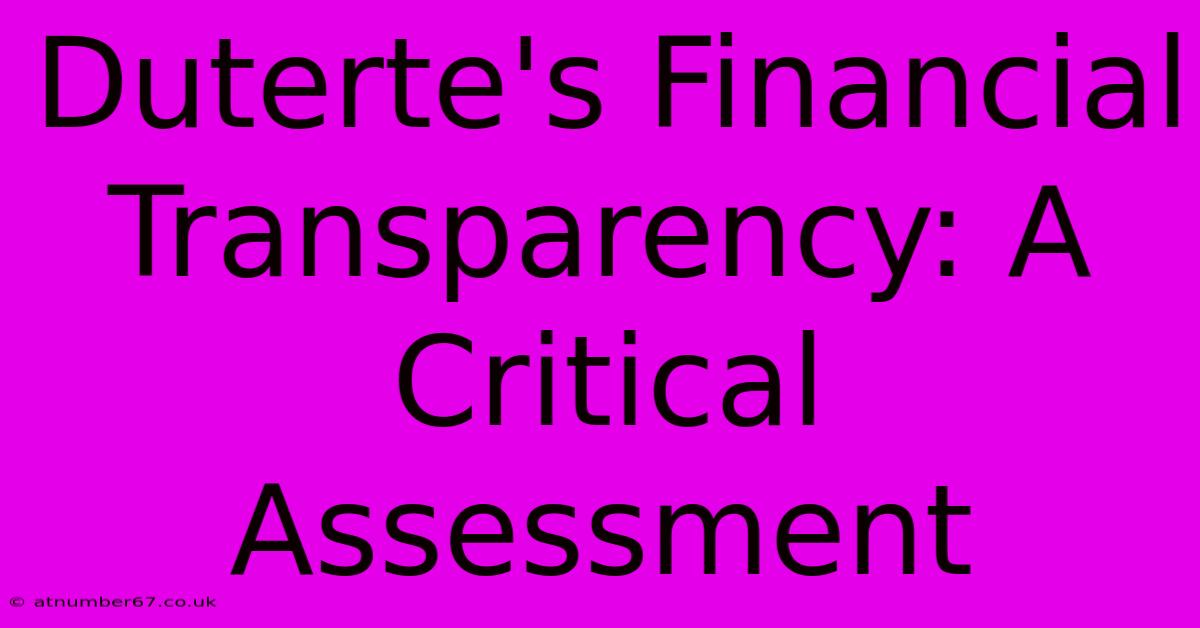Duterte's Financial Transparency: A Critical Assessment

Table of Contents
Duterte's Financial Transparency: A Critical Assessment
The presidency of Rodrigo Duterte in the Philippines (2016-2022) was marked by significant policy shifts and a strongman style of leadership. While his administration touted successes in infrastructure development and the war on drugs, a critical assessment of his government's financial transparency remains a complex and contentious issue. This article delves into the promises made, the realities encountered, and the lingering questions surrounding the financial transparency of the Duterte administration.
Promises of Transparency vs. Reality
During his campaign, President Duterte promised a clean and transparent government, vowing to tackle corruption head-on. He emphasized the need for accountability and pledged to make government finances readily accessible to the public. However, the actual implementation of these promises faced significant challenges.
The "War on Drugs" and its Financial Implications
The controversial "war on drugs" campaign, a cornerstone of the Duterte administration, raised serious concerns about financial transparency. The lack of detailed accounting for funds allocated to the campaign, coupled with allegations of extrajudicial killings and police misconduct, fueled skepticism regarding the government's commitment to openness. Independent investigations and reports by human rights organizations highlighted the need for greater transparency in the use of funds related to anti-drug operations.
Infrastructure Projects and Public Procurement
The "Build, Build, Build" infrastructure program, a flagship initiative of the Duterte administration, involved massive public spending. While the program aimed to boost economic growth and improve infrastructure, questions arose regarding the transparency of the procurement process. Concerns emerged over potential favoritism, lack of competitive bidding, and insufficient public disclosure of project costs and contracts. These issues cast a shadow on the administration's claims of financial transparency in large-scale infrastructure development.
Access to Information and Government Data
Despite the constitutional right to information, accessing government data and financial records during the Duterte administration proved challenging for journalists, researchers, and civil society groups. Requests for information often faced delays, denials, or were met with incomplete responses. This restricted scrutiny and hindered independent assessments of government spending. The lack of readily available and easily understandable data hampered public oversight and increased the risk of corruption.
Lingering Questions and the Need for Reform
The Duterte administration's legacy on financial transparency remains a subject of debate. While some progress was made in certain areas, significant shortcomings persist. Several crucial questions remain unanswered:
- How were funds allocated to the "war on drugs" specifically used? A comprehensive, publicly accessible audit of these funds is crucial to ensuring accountability and preventing future abuses.
- What mechanisms are in place to ensure transparency and prevent corruption in large-scale infrastructure projects? Strengthening independent oversight bodies and implementing robust public procurement procedures are vital.
- How can access to government data and financial records be improved? Strengthening the Right to Information law and promoting data openness are essential for fostering greater public trust.
Conclusion: The Path Forward
Improving financial transparency in the Philippines requires sustained effort and commitment from all stakeholders. Strengthening institutions, promoting data openness, and enforcing accountability mechanisms are crucial steps. Independent oversight bodies should be empowered to conduct thorough audits and investigations, while the media and civil society must play a vital role in holding the government accountable. Only through such comprehensive efforts can the Philippines build a more transparent and accountable government. The legacy of the Duterte administration serves as a stark reminder of the ongoing need for reform and the importance of vigilant public scrutiny in upholding the principles of good governance.

Thank you for visiting our website wich cover about Duterte's Financial Transparency: A Critical Assessment. We hope the information provided has been useful to you. Feel free to contact us if you have any questions or need further assistance. See you next time and dont miss to bookmark.
Featured Posts
-
The Secrets Behind Stephen Cloobecks Fortune
Apr 03, 2025
-
Revealing Bugoy Carinos True Age
Apr 03, 2025
-
Beckhams Daughter S Pregnancy Whats Next
Apr 03, 2025
-
The Secret To Sunny Leones Youthful Appearance
Apr 03, 2025
-
Kanimozhi Sons Impact On The Community
Apr 03, 2025
